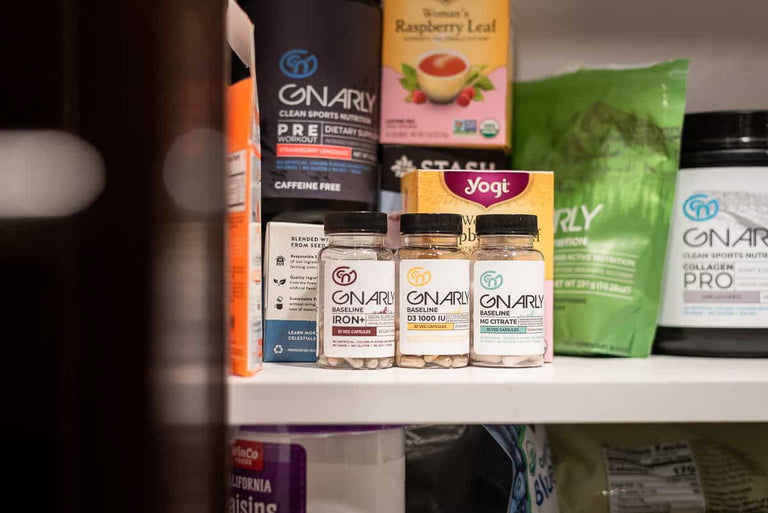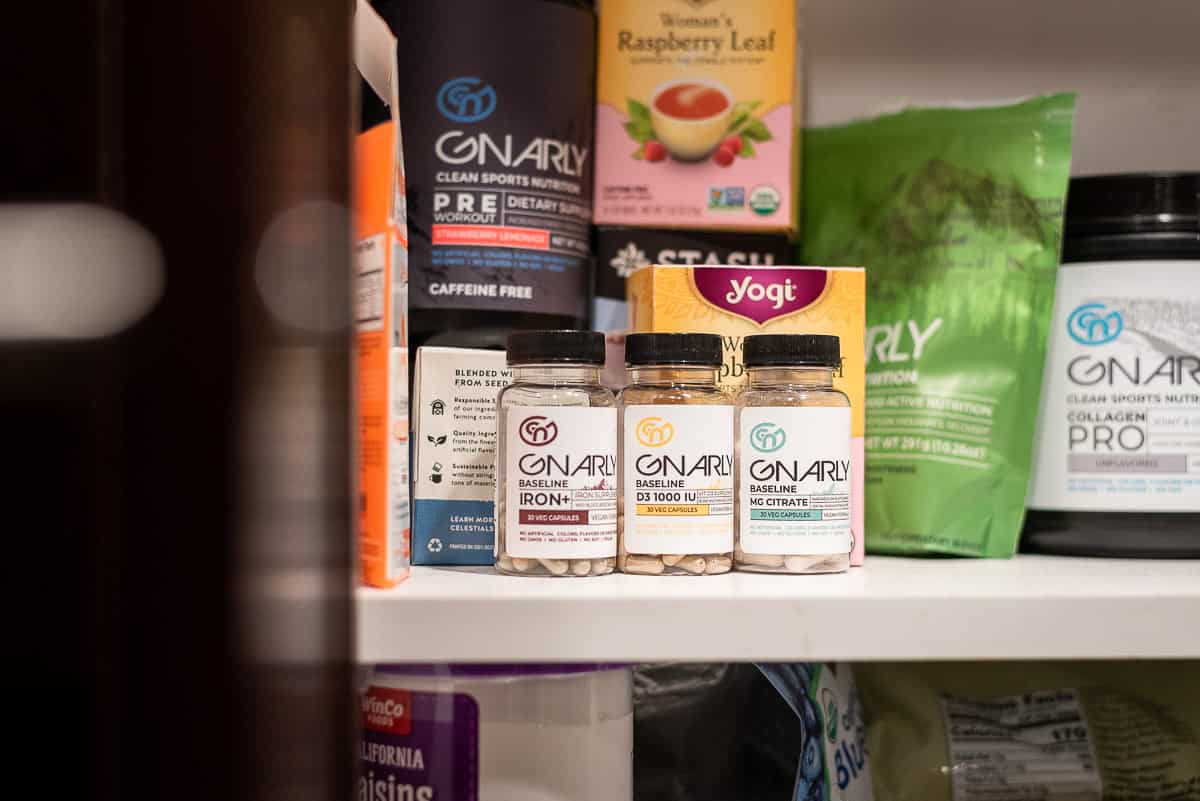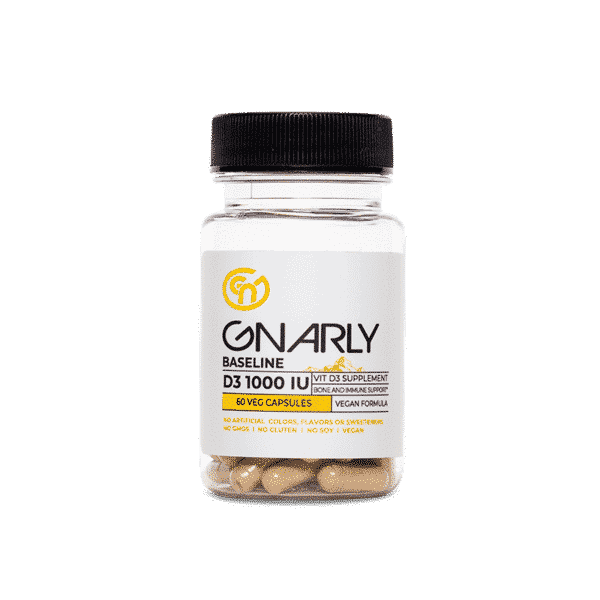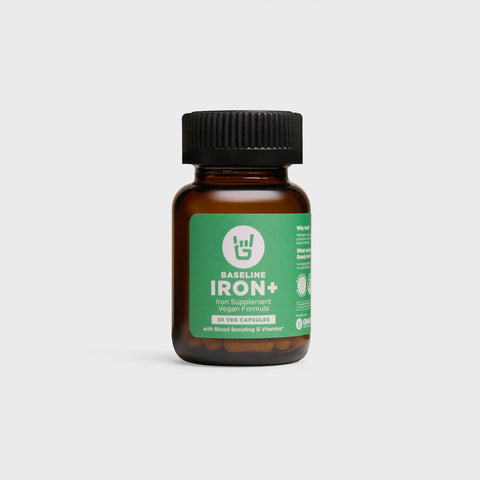Achieving and maintaining a baseline level of health helps athletes perform and recover optimally. This baseline health is a broad and complex spectrum of physical, mental, and emotional health markers for which nutrition is a pillar. If these baseline nutritional needs are not being met, then at a minimum, athletic goals will not be achieved, but more serious sickness and injury could result.
Our new line of products, Gnarly Baseline, is designed to help you fill in nutritional gaps in your baseline health, thus creating a strong foundation to support optimal performance and recovery.
The purpose of this article is to give you a brief overview of the reasoning behind the addition of these products to the Gnarly line and to provide a short description of what you can expect from each of our three new products.
watch the full gnarly baseline series video
Vitamin d3

Why?
Vitamin D plays an integral role in immune function, protein synthesis, muscle function, cardiovascular function, inflammatory response, cell growth, and musculoskeletal regulation. Although vitamin D can be found in some foods, the majority of vitamin D is synthesized by the skin upon exposure to sunlight. The major cause of Vitamin D deficiency is inadequate exposure to sunlight, which can be a consequence of a number of things including latitude, lifestyle, sunscreen practices, and skin pigment.
An estimated 1 billion people worldwide currently have vitamin D deficiency and a recent meta-analysis that grouped together 23 studies, and included a total of 2,313 athletes across a range of sports, found that 56% of people had insufficient levels of vitamin D. Research has shown that the correction of vitamin D deficiency in athletes is associated with fewer respiratory infections as well as reduced injury rates and better sports performance.
What you can expect from Gnarly D3 1000 IU
Most supplemental D3 is not vegan as it’s derived from lanolin or sheep’s wool. Gnarly Baseline D3 1000 IU is a natural plant-based extract derived from lichen that provides cholecalciferol, the most biologically active form of vitamin D. Gnarly specifically sourced this plant-based extract and chose to use vegetarian capsules to make a product that could be used by vegan and non-vegans alike.
magnesium
why?
Magnesium is involved in more than 300 metabolic reactions in the body. Specifically, it helps maintain normal nerve and muscle function, heart rhythm, vasomotor tone, blood pressure, immune function, bone integrity, blood glucose levels and promotes calcium absorption. Approximately 60% of adults in the United States do not consume the Recommended Dietary Allowance (RDA) for magnesium. Magnesium deficiency has also been documented in a wide range of athletes including adventure racers, gymnasts, collegiate soccer players, rugby players, runners, and swimmers. Research has demonstrated that magnesium supplementation in athletes can positively impact blood pressure and muscle function.
Additionally, magnesium plays an important role in the activation of vitamin D. Research has demonstrated that vitamin D deficiency is better corrected when vitamin D and magnesium are taken together as opposed to supplementing with vitamin D alone.

What you can expect from Gnarly Mg Citrate
Many forms of magnesium are poorly absorbed and thus have a laxative effect. Magnesium citrate is a highly bioavailable form of magnesium that is well-absorbed by the body. One capsule of Gnarly Mg Citrate contains 200mg of magnesium. The only other ingredients are rice bran and vegetarian capsules, making it hypoallergenic and vegan friendly.
Iron, B12 and Folate

Why?
Iron is essential for blood production. It serves as a functional component of hemoglobin, which delivers oxygen from the lungs to tissues, and myoglobin, the protein responsible for accepting, storing and releasing oxygen in muscles. The groups at highest risk for iron deficiency include females of childbearing age, strict vegetarians/vegans, and endurance athletes. Falling into more than one of these groups significantly increases risk.
Iron deficiency has been observed among women competing in a wide range of sports, with anemia found principally in female runners and skiers. Iron supplementation not only improves iron status but also increases work capacity and reduces exercise heart rate and lactate concentration. Vitamin B12 and folic acid support healthy red blood cell production and support the role of iron in the fortification of blood. Athletes on energy-restrictive diets and strict vegetarians/vegans are at risk for B12 deficiency. Vitamin B12 or folate deficiency anemia causes the body to produce abnormally large red blood cells (hemoglobin) that cannot function properly.
What you can expect from Gnarly Iron+
Gnarly Iron+ uses iron bisglycinate, a highly bioavailable form of non-heme iron that won’t cause stomach upset. Vitamin C is also included to improve iron absorption. Additionally, to support the role of iron in healthy red blood cell production, Gnarly Iron+ contains methylcobalamin, the active form of vitamin B12 as well as L-5 Methyltetrahydrofolate (L-5 MTHF), the predominant and naturally occurring form of folate in food. Gnarly Iron+ is vegan friendly and should be consumed with food.
So, is the Gnarly Baseline series for you?
While not everyone may need to supplement with these nutrients, we hope this article gives you a good overview of the importance of these nutrients in building baseline health and an understanding of who may benefit most from them. We are really excited about the addition of this line to the Gnarly Nutrition offering and hope you are too.
Please reach out if you have any questions about this new line!

references
de la Puente Yagüe, Mirian et al. “Role of Vitamin D in Athletes and Their Performance: Current Concepts and New Trends.” Nutrients vol. 12,2 579. 23 Feb. 2020, doi:10.3390/nu12020579
Morris, Howard A., and Paul H. Anderson. “Autocrine and paracrine actions of vitamin D.” The Clinical Biochemist Reviews 31.4 (2010): 129.
Volpe, Stella Lucia PhD, RD, LDN, FACSM Magnesium and the Athlete, Current Sports Medicine Reports: July/August 2015 – Volume 14 – Issue 4 – p 279-283
doi: 10.1249/JSR.0000000000000178
Lukaski, Henry C. “Vitamin and mineral status: effects on physical performance.” Nutrition 20.7-8 (2004): 632-644.








